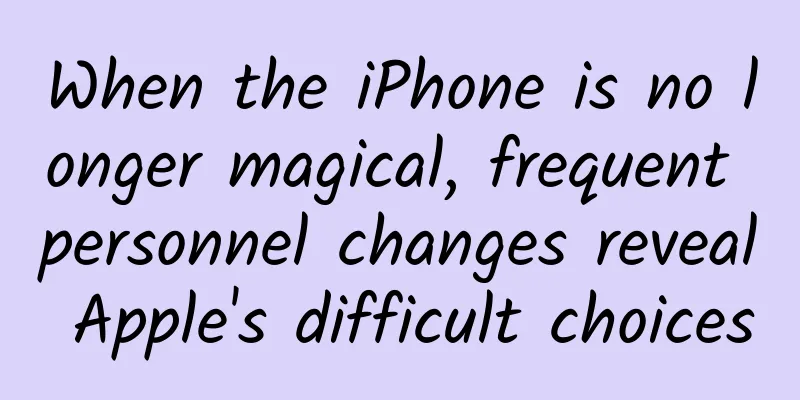When the iPhone is no longer magical, frequent personnel changes reveal Apple's difficult choices

|
Without waiting for too much speculation from the outside world, Apple quickly made a decision on the future of 5G (chips). On Tuesday, Apple and Qualcomm unexpectedly resolved their legal dispute over chip patent fees. At the same time, Intel announced that it would abandon its 5G smartphone modem business. This means that the next generation of iPhones will continue to use Qualcomm's 5G chips, and it will also further speed up the launch of the 5G version of the iPhone.
There are no permanent enemies or friends in the face of interests. The result of both parties giving up all lawsuits is undoubtedly a good thing for consumers who love iPhones. At the very least, the next generation of iPhones will have better signals. Even as Apple is resolving its chip dispute, personnel changes at the tech giant continue, and the ongoing appointment and removal of executives makes Apple's future direction even more intriguing. A year of rare management turmoil In the past few years, Apple has been the "most stable" company in the technology field on this planet. The long-term stable management also allows Apple to invest more energy in business operations and product development. But when the iPhone is no longer so "magical", Apple now has to start looking for new ways to grow, and this is naturally accompanied by a series of changes in senior executives. On April 16, Angela Ahrendts, Apple's senior vice president of retail, officially resigned. In fact, this is not new news. As early as February this year, Apple mentioned that Angela would leave in a document submitted to regulators, and deleted the personal information about Angela Ahrendts on Apple's leadership profile page last weekend. But when this senior vice president and second-in-command of the company, who had worked at Apple for five years, officially left, the outside world was still full of curiosity about why he left Apple. In this regard, some industry analysts believe that the real reason for Angela Ahrendts' departure from Apple is related to the serious decline in Apple's sales performance. According to Apple's fourth quarter 2018 financial report released in January this year, Apple's revenue in the quarter was US$84.3 billion, a 4.5% decrease from US$88.293 billion in the same period last year; Greater China became the most severely declining sector, with revenue for the entire Q4 being only US$13.169 billion, a 27% decrease from US$17.956 billion in the same period last year. The reason for this is that the price of iPhone has been rising in recent years, which has caused trouble for consumers. Earlier, at the company's financial report meeting, Apple CEO Cook also admitted that the high price was one of the reasons for the slowdown in iPhone sales. The outside world believes that this high-price sales policy was largely formulated by Angela Ahrendts, the former CEO of luxury brand Burberry. In addition, as the person in charge of Apple's retail business for the past five years, Angela Ahrendts did not make the communication between Apple and consumers closer. Many problems emerged one after another: customer satisfaction declined, Apple stores changed from connecting users to selling products, and the turnover rate of Apple store management and employees increased. Data shows that the normal turnover period of Apple store employees used to be 6 to 8 months, but in the past year it has reached 2 to 3 months. Someone needs to take the blame for all this, and Angela Ahrendts, who earns Apple's highest salary and is in charge of retail, is naturally responsible. In fact, since the news that Angela Ahrendts was about to leave was announced at the beginning of this year, relevant executive personnel changes have been underway. Among them, Deirdre O'Brien, vice president of human resources, was appointed as Ahrendts' successor, John Giannandrea, head of AI business, was promoted to senior vice president, and Stasio, director of voice assistant Siri, was fired. In addition to the appointment and removal of senior executives in marketing, personnel and other departments, the departure of big names in Apple's core department, technology research and development, also reveals the overall direction of Apple's development. In March 2019, it was revealed that Gerard Williams III, senior director of platform architecture, had resigned. This technical expert who had worked at Apple for 9 years had been responsible for overseeing SoC architecture at Apple. In the months before his departure, Siri co-founder Tom Gruber and search business head Vipul Ved Prakash also left the company. So far, all three Siri founders have left Apple. In addition, the termination of the AirPower project and the cancellation of the self-driving project Titan also led to the layoff of a number of engineers. Among them, the Titan project laid off more than 200 people, reportedly because the level of related technology research and development was far behind that of Waymo, General Motors and other companies. Obviously, this series of continuous personnel changes has caused some psychological shock to Apple's internal employees. Because Apple's entire management has been very stable in the past five years, with almost no changes. According to foreign media reports, a series of management turmoil has forced the suspension of multiple projects within Apple. It is reported that Apple has set up a suspension mechanism for development projects so that managers can "re-evaluate project priorities" to avoid going further and further in the wrong direction. However, analysts are more concerned about whether there will be more personnel changes at Apple during Cook's three years in office, as this will have a greater impact on Apple's future three years later. Weak hardware growth and exploration after 2021 After succeeding Steve Jobs as Apple CEO in 2011, Cook led the legendary company to its peak. During his first six years in office, Apple's operating profits and revenues delighted shareholders. However, at the "Apple 2018 Shareholders Meeting" at the beginning of last year, Cook officially talked about the issue of succession and proposed that one of his important tasks in the future is to "pass the baton correctly." According to the original agreement and the resolution of Apple's board of directors, Cook's term will not end until at least mid-2021. So who will take over in three years? How will Apple make a smooth transition before taking over? These are important questions for Apple. As the current head of Apple, Cook is constantly compared to Steve Jobs. The biggest difference between Cook and Steve Jobs is that he does not personally design and innovate products like Steve Jobs, who was an engineer. As a professional manager, Cook pays more attention to the overall direction of the Apple ship. This is why Apple's products have been criticized for their innovation in recent years, but the company's overall stock price and market value continue to break records. However, since Q4 2017, the iPhone, as the company's mainstay product, has been showing a trend of slowing growth. Not long ago, Apple's financial report for the first quarter of fiscal year 2019 showed that iPhone sales were $51.98 billion, a year-on-year decrease of 15%. In sharp contrast, Apple's service business has set a record high. Data shows that in the first quarter, Apple's service business revenue reached $10.88 billion, a year-on-year increase of 19%, accounting for 12.9% of Apple's overall revenue. Currently, the service business is Apple's second largest source of revenue after the iPhone, and the gross profit margin of the service business is as high as 62.8%, which is much higher than the 41.1% of the hardware business. Under such circumstances, Cook will naturally focus more on the service business. From the spring conference in March this year, we can see that Apple did not release any hardware products at the conference. The protagonists of the spring conference were a series of service products such as Apple News+, Apple Card, Apple TV+, Apple Arcade, etc. In this regard, Gene Munster, an analyst who has been following Apple's development for a long time and managing partner of venture capital firm Loup Ventures, said that this series of actions is a striking signal that Apple is trying to explore the right direction for development in the next decade. A more correct statement should be that it is an important signal of the direction Apple should go in three years. In addition to increasing investment in software and service businesses, Cook also sees the health care sector as an important machine for Apple in the next decade. It is reported that there are dozens of doctors on duty in Apple's health care team. Apple is seeking breakthroughs in the research and development of medical technology and hopes to integrate all these technologies into its hardware products such as Apple Watch, iPad, iPhone, etc. The healthcare industry has always been a high-profit market, and the domestic healthcare industry in the United States has also been showing a rapid upward trend in the past few years. Data shows that the output of the healthcare industry in the United States currently accounts for 18% of GDP, and this proportion is expected to expand further in the future. The keen Cook naturally saw this "delicious cake", which can allow Apple to expand its service business scope while stimulating the sales of its wearable devices and smart hardware products. Regarding Apple's personnel changes and changes in management style, Gene Munster, managing director of venture capital firm Loup Ventures, emphasized: "Apple reinvents itself every 10 years, and now Apple is reinventing itself again. This time it is mainly centered around services, including AI, AR, and some medical and health service businesses." Obviously, the time period analyzed by Munster - a reshaping every ten years - falls within three years of Cook's tenure. 【Conclusion】 Apple has abandoned the "luxury" trend, suspended unmanned driving, which is difficult to make money, and focused on service business and health care. These attempts are all preparations for a rainy day. After all, many hardware businesses represented by the iPhone still contribute 85% of Apple's revenue. In addition to the slowdown in iPhone growth, the Q1 report for fiscal year 2019 shows that sales of Mac, iPad, wearable devices, smart home and accessories have increased significantly year-on-year. Of course, from Cook's perspective, he must not only think about the present, but also plan the right development direction for Apple in the next five or even ten years. At present, the software service business is exactly what he sees as Apple's "best future". But can such a bet succeed, and can Apple continue to maintain its innovative style in the minds of consumers in the next few years? No one can guarantee this. At least there is one thing that many people agree on now: a few years ago, people bought Apple products because they were constantly impressed by the innovation, but now many people buy Apple products just because it is Apple. |
<<: Google accidentally releases first 'release candidate' of Fuchsia OS
>>: People always say that iPhone runs smoothly without any lag, but Android runs very laggy?
Recommend
Grand Central Dispatch Tutorial
In the first part of the tutorial, you learned so...
With large-scale sandstorms approaching, how are sandstorms classified? What are the criteria for issuing sandstorm warnings?
Whenever the weather turns warmer, some relativel...
Say goodbye to iOS and common off-screen rendering!
The optimization of mobile applications mainly de...
How is the official version of iOS 15.6? Take this test report now
The iOS system is the operating system installed ...
Case analysis: The operation and promotion methods of "Lian Coffee"!
When I was doing a community survey on mini progr...
The "tornado" of online medicine purchases cannot blow away Dingdang Express Medicine
As control measures were relaxed, the number of p...
This carcinogenic toxin exists in every home! When cleaning, you must pay attention to these 3 places!
How often do you clean your house? Once every two...
Little Pomegranate Talks Popular Science·Sweetness is in the “New”丨Rare “Dinosaur Egg”, is it a fruit or an egg?
Your browser does not support the video tag Xinji...
How to scientifically improve conversion rate and click-through rate?
When it comes to Internet advertising , everyone ...
How to do new media promotion? Real estate planning case details
Introduction: Interactive content and full networ...
How does Ele.me manage product operations with low ROI?
"Free fruit" is a classic operation pro...
What exactly is going on with renting a boyfriend or girlfriend during the 2020 Spring Festival? How much?
The 2020 Spring Festival is approaching, and many...
iQOO 8 Pro: From all-rounder to flagship, it spans both gaming and Vlog, making it the best smartphone for everyone
In 2019, vivo launched its sub-brand iQOO. From t...
I don't allow people who are afraid of injections to not know about nano microneedles!!
The same world, the same kind of "needle pho...









